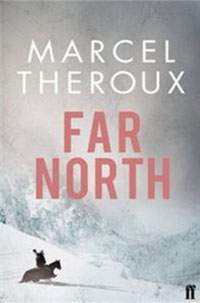By Marcel Theroux

But it didn't last. The climate effects pushed more and more people north until eventually there wasn't enough of anything to go around anymore, thieving, begging and violence reared their ugly heads and as struggles for power and control over resources began, peace collapsed and human civilisation died-off to almost zero.
When we meet the scarred and solitary Makepeace patrolling the town of Evangeline, it is, like all cities and towns, empty and abandoned. Technology and all its modern convenience has faded away and survivors are reduced to a few pockets of habitation eeking out a meagre existence on the land in whatever way they can. But Makepeace knows how to farm the land, to track and kill game, to shoot and build and live this life. And she has her Father to thank for that. But things change for Makepeace when she sees a plane crash in the woods near her home. Setting out on an epic journey to see the world outside of her own town she decides to find where it came from. Her journey and the subsequent ordeals of capture, imprisonment, work camp and beyond force her to confront revelations about her past, and inevitably change her view of her own future.
Marcel Theroux's fourth novel - and his first science fiction novel - is a beautiful, slow-burning book that rewards the patient reader with a fascinating and compelling story that will be remembered long after it's put down. Small wonder then that it made the shortlist for this years Arthur C Clarke Award for Science Fiction Literature and while it didn't win the award, it was well deserving of its place and we can hope that Marcel continues to work in the genre for many years to come.
Told in the first person it reads like a biography, written in short, fragmented sentences inflected with the backwoods English of Makepeace's Quaker upbringing. That Makepeace is a woman is held back from the reader for the first 20 odd pages and when the reveal comes it feels strangely inevitable, but the revelation of her gender makes a nice counterpoint to the wild-west, frontier setting and also explains her entirely practical nature. At one point in the book she tracks a man who has stolen her horse and her guns through thick snow, but rather than attack him, she takes stock of the extreme cold weather and decides to wait it out, knowing he will freeze to death well before he gets away.
It's this practical and hard-bitten nature that allows Theroux to skirt over some aspects of the story as Makepeace decides there's not much to tell or just doesn't want to dwell on those things but it's often what is left unsaid, leaving the reader to fill in the gaps, that make the book utterly believable. It also helps that she has only a vague understanding of the world that was left behind, being too young and too naive to have experienced much of it. When she does eventually encounter a city in 'The Zone' it fascinates her as much for the things she doesn't understand as for the things she doesn't.
Comparisons to Cormac McCarthy's 'The Road' and Russell Hoban's 'Riddley Walker' are easy to draw with the desolate and brutal post-apocalyptic setting, indeed Theroux himself cites the Strugatsky Brothers 'Roadside Picnic' (the inspiration behind Tarkovsky's film, 'Stalker'.) as a major influence but these simple comparisons are unfair on an author just getting into his stride and writing in this genre for the first time.
Theroux has travelled extensively through Russia, the Ukraine and Northern Siberia and has met the tough folk who live there even in the aftermath of Chernobyl. This experience really shines in the sections where Makepeace is just living her life, in the stoic resignation in her voice and the way she just gets on with things and doesn't over-analyse.
There are flaws, as in all things, mostly coincidence and compression but they are forgivable. The chance meeting with someone from the past that offers some closure to an episode she'd rather forget is an unnecessary resolution and the city in The Zone harbours an unexplained technology that serves as nothing more than a device to bring about the inevitable escape; the ending too offers a rebirth that feels a little too 'pat' but for all this Far North is a fine, fine novel, incredibly well realised, beautifully written and well worth seeking out.
In terms of The Arthur C Clarke Award, my sincere feeling is that if The City & The City hadn't been in the shortlist, Far North would have been the winner by a country mile, it's that good, and if a recommendation is what you're after they don't get much more solid than that.
Far North is published by Faber & faber and is available from Play.com, Blackwell and all good book stores.
If you want to watch an interview with Marcel Theroux where he talks about writing Far North CLICK HERE.
Marcel's website is here.